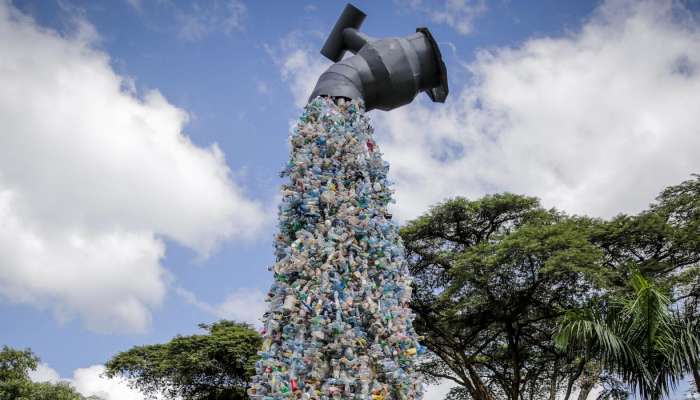

New York: A year after international delegates agreed to strike a deal on plastic pollution and finalise it by 2024, the United Nations Environment Programme has launched a report laying out a path to dramatically reduce the volume of plastic that ends up in the environment.
Based on a framework of proven techniques to tackle plastic pollution, Tuesday’s report lays the groundwork and demonstrates what is possible. The findings point to systemic changes that could reduce plastic pollution more than three-quarters by 2040, while creating hundreds of thousands of jobs and saving trillions of dollars.
“The report shows that only an integrated, systemic shift from a linear to a circular economy can keep plastics out of our ecosystems and bodies, and in the economy.” UNEP director, Inger Andersen wrote.
The release comes ahead of a meeting of global delegates in the French capital later this month. It will be the second round of talks on the agreement, which the UN Environment Assembly has described as "the most significant environmental deal since the Paris (climate) accord."
The world currently produces about 350 million tons of plastic pollution each year, causing biodiversity loss, global health and food supply issues.
What needs to happen?
The report calls for bans and agreements to eliminate unnecessary and problematic plastics — including those that cannot be recycled, reused or composted, as well as overpackaging or plastics that contain chemicals dangerous to human health.
It also lays out a three-pronged approach of reusing, recycling and switching to alternative materials.
Reuse measures — such as refillable bottles, reusable bags, bulk dispensers in grocery stores, deposit-return schemes, and packaging take-back schemes — are the lowest hanging fruit, cutting plastic pollution by 30% by 2040.
Countries such as France, and its 2021 anti-waste law, are already laying the groundwork to improve reuse rates through measures such as requiring large grocery stores to provide some form of reusable container for customers and banning disposable plates.
Improving recycling rates could be achieved through more stringent design standards and banning of problematic additives and polymers to ensure easier recycling. Removing fossil fuel subsidies would also make recycling more economic than producing virgin plastic, the report found. Improved recycling rates could lead to a 20% reduction in plastic pollution.
Countries such as Spain and the UK already have taxes and levies on virgin plastic production to help level the playing field. And Mexico increased recycling rates from 8.8% in 2002 to 56% in 2018 by incentivising recycling.
A further 17% reduction in plastic pollution would come from moving towards other materials for things like wrappers, sachets and takeaway items.
Yet still, humanity would produce about 100 million metric tons of plastic waste from short-lived products.
This would have to be disposed of in a more responsible way to avoid ocean plastics. To tackle microplastic pollution, for example, the report suggests changes to textile production and reducing vehicle mileage to restrict tire abrasion.
The economic benefits
According to the UNEP report, the outlined systemic shifts would result in savings of $4.5 trillion (€4.1 trillion) by 2040.
Some costs would be saved by producing less single-use plastic, but most relate to expenses currently being externalized by plastic producers, such as health and clean-up initiatives.
Steven Stone, deputy director of the UNEP economy division and a contributing author to the study, told DW that the science was increasingly clear regarding the cost implications of plastic pollution. A major source of hidden expenditure goes on human health — including cancers and development issues caused by exposure to plastic and its associated chemicals.
To finance the upfront costs involved in transitioning, the report found governments could divert planned investments for new plastic production facilities into circular infrastructure.
Implementing all the their recommendations would lead to the creation of about 700,000 additional jobs, according to the report's authors. Many of these would be centered around the formal recovery of plastic and its reuse, especially in lower-income nations that don't yet have robust waste-management systems.
Does this mean the end of plastic?
Stone said the UNEP's goal wasn't to entirely stop the use of plastics, but to end plastic pollution.
"Plastics have their highest value when you keep them in use. They're strong, they're light, they're used in cars, they're used in airplanes, they have very specific functions for society that create a lot of value. So we're not trying to demonize plastics by any means."
Stone said the goal is to make it financially compelling for companies to engage in the process, similar to the race to create alternate refrigerants after global treaties banned CFCs to stop the depletion of the ozone layer.
"It's not really a win for industry to keep pumping out single-use plastics that become garbage and contaminate everybody," Stone added.
"The main story of the report is that plastics look cheap, but they're really not. Because the costs have been externalized either into the future, or onto others who have didn't necessarily use the plastic, but will pay the cost of being exposed to it."